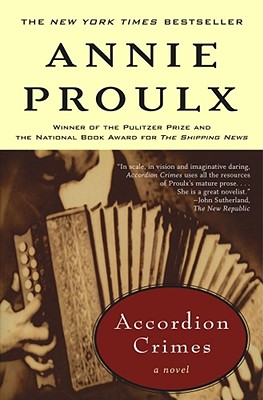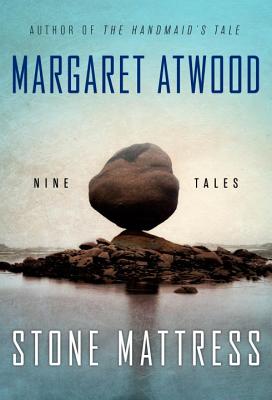Tuesday, February 26, 2013
Notes From the Nightstand: Accordion Crimes
I have probably read this book four times now. I love all of Annie Proulx's books (The Shipping News is her most famous one, I think), but this is my favorite, and one of my favorite books ever, really. The combination of history and music and narrative takes everything I love and rolls into one nearly perfect experience for me. I return to it again and again and probably always will.
Accordion Crimes isn't exactly a novel in the traditional sense, but I feel like it's a little more than a book of short stories. When I read Olive Kitteridge, which is a series of stories about the title character told from different people's points of view which together tell Olive's life story, I was reminded of Accordion Crimes. The pieces are separate but combine in a satisfying way to tell a larger tale.
Proulx's book follows a green accordion from it's creation in Italy and immigration to America with it's Sicilian maker in the 19th century through seven other stories set in various immigrant and ethnic communities across America up to the present day. Each chapter (or short story) introduces the little two-row button accordion into a region, a culture, a musical tradition, an era of American history that, when strung all together, tells a vagabond story about us as a nation and a people - how alike we are, and how different. From Sicilians in New Orleans to Germans and Tejanos in Texas to French Canadians in Maine and French Cajuns and Black Creoles in Louisiana to Poles in Chicago to Irish-American and Basque ranchers in Montana to Norwegians in Minnesota, we Americans have a complicated set of identities, histories, habits, and tastes. Individual experiences combine to tell a common story of migration and settlement, music and food and religion, xenophobia and assimilation.
Music is one of the great treasures of American culture. In our attempt to hold on to our pasts, to maintain our identities in a New World, we have hung on to the musical traditions of our ancestral homelands, celebrating them and preserving them. But we are an amalgamation nation, and it's not surprising that the music has been combined and melted down and reshaped by Americans into new styles and new sounds: jazz, blues, zydeco, bluegrass, country, and rock. So often, the little unassuming, under appreciated accordion is at the center of it all.
The stories Proulx tells are not pretty. They are as harsh and cruel and violent and dirty and tragic as migration and homelessness are. America is rough country. The characters are not particularly lovable or genteel. They are survivors, scrabbling at the edges of civilization, determined not to be snuffed out. And if you listen to any traditional American music, you will hear their sorrow, suffering, and defeat, mixed with their joy, celebration, and perseverance. This is what it means to be American. This is our story.
Subscribe to:
Post Comments (Atom)



Very well written, Amanda. Makes me want to read the book, as all of your book reviews do. Keep writing! Love, Mom
ReplyDeleteMom! You're embarrassing me in front of my friends. :)
ReplyDeleteAs soon as I posted it, I wanted to take a hatchet to it in a few places. Someday I'll have more time, time, time to rewrite and edit. Oh well.